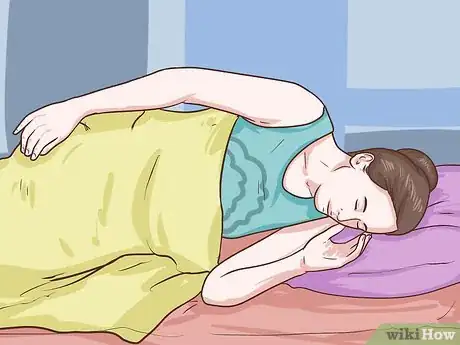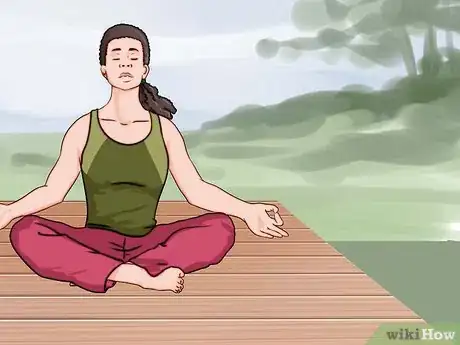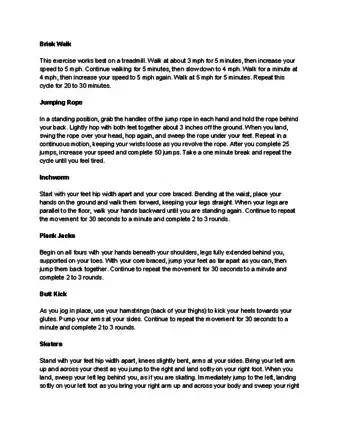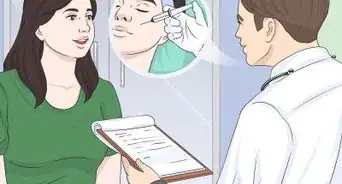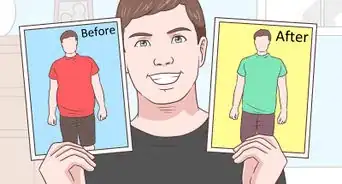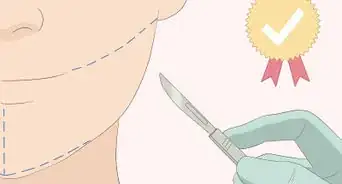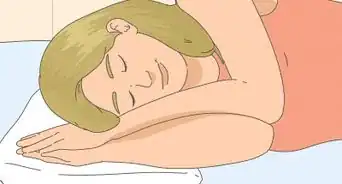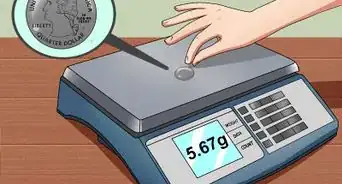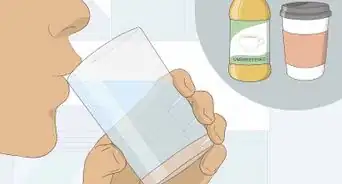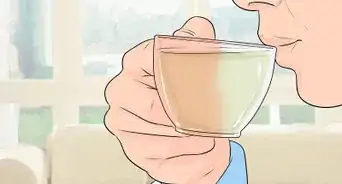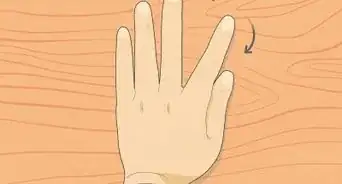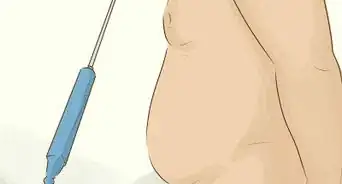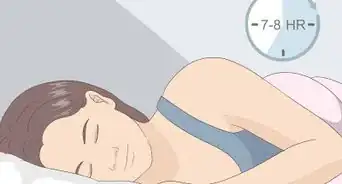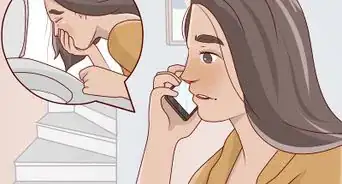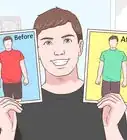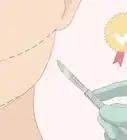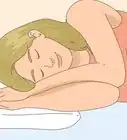This article was co-authored by Pouya Shafipour, MD, MS. Dr. Pouya Shafipour is a Family Medicine Specialist, Primary Care Physician, and a Weight Loss Specialist based in Santa Monica, California. Dr. Shafipour specializes in dietary, nutritional, behavioral, and exercise counseling to manage obesity and medical conditions related to excessive weight gain or loss. Dr. Shafipour received a BS in Molecular and Cell Biology from the University of California, Berkeley, an MS in Physiology and Biophysics from Georgetown University, and an MD from the Loma Linda University School of Medicine. He completed his internship in general surgery at UC Irvine and a residency in family medicine at the University of California, Los Angeles, and became board certified in family medicine in 2008.
There are 17 references cited in this article, which can be found at the bottom of the page.
wikiHow marks an article as reader-approved once it receives enough positive feedback. In this case, 89% of readers who voted found the article helpful, earning it our reader-approved status.
This article has been viewed 148,169 times.
Research shows that women tend to lose weight more slowly than men,[1] which can be frustrating if you're trying to take weight off quickly. If you want to lose weight fast and keep it off, then skip the fad diets. Your best bet is to make safe and realistic lifestyle changes that you can sustain in the long term. You will need to monitor your diet, exercise levels, and other lifestyle behaviors. These types of changes will help you lose weight quickly while improving your health rather than damaging it. Implementing a few tips and tricks will help you lose weight fast.
Steps
Changing Your Diet
-
1Consume fewer calories. To lose weight, you'll need to cut out some of the calories you eat each day. Making a calorie deficit is the first step to quick weight loss.[2]
- Most health professionals will recommend cutting out anywhere from 500-750 calories daily. This will yield about a 1–2-pound weight loss each week.[3]
- Never consume less than 1,200 calories per day. Eating fewer calories than this will make it almost impossible to consume enough nutrients to sustain daily bodily functions. Also, your body can go into starvation mode, retaining what nutrients it does receive, and inhibiting your metabolism. [4]
- Start keeping track of the calorie content of all the foods you eat and measuring your portion sizes. Read nutrition labels or use online calorie calculators like Calorie King or MyFitnessPal for calorie information.
-
2Choose more lean protein and non-starchy vegetables. When you are restricting the number of calories you eat, it's important to make nutritious food choices so that you provide your body with the nutrients it needs.[5]
- Studies show that diets comprised of mostly lean proteins and vegetables result in quicker weight loss compared to other dieting styles (like low-fat diets).[6]
- Include a variety of lean protein options like poultry, eggs, low-fat dairy, seafood, legumes or lean beef.
- Non-starchy vegetables should be eaten at each meal and snack. Choose items like broccoli, green-leaf salad, cauliflower, green beans, artichokes, eggplants, Brussels sprouts, celery, kale, Swiss chard, asparagus, or tomatoes.
- Although starchier vegetables are a healthy choice, they are higher in carbohydrates which you should limit to some degree if you want fast weight loss.[7] These include vegetables like carrots, peas, corn, potatoes and sweet potatoes.
Advertisement -
3Eat fruit and whole grains in moderation. Although these foods are healthy additions to any diet, they contain slightly higher amounts of carbohydrates which can slow your rate of weight loss.
-
4Limit snacks. When you're trying to lose weight quickly, you'll need to keep tight control on your daily calorie intake. Snacks should be limited to help support this.[10]
- Having the occasional snack may be appropriate. If you're choosing to snack, keep the calories below 150 per snack.[11]
- Include some lean protein to help keep you satisfied until your next meal and a fruit or vegetable for an extra hit of fiber, vitamins, and minerals.
- Have a snack if there is more than two hours prior to your next meal or before or after a workout.
-
5Drink plenty of water. Not only does drinking enough water help your body function properly, it can aid in weight loss by keeping you full in between meals.
- Most experts will tell you to drink at least eight 8-oz glasses of water per day. They may even suggest consuming up to 13 glasses daily depending on gender and activity level.[12]
- If you struggle with overeating, then drink two full glasses of water before each meal to help fill your stomach up.
- People oftentimes mistake thirst for hunger. If you find yourself desperately craving a snack but are not physically hungry, chances are that you're dehydrated.
-
6Cook more meals at home. It's a lot easier to control portion sizes and calorie content when you cook your own meals at home.
- If you must eat out, order a healthier option. You could try: salad with some type of lean protein (like salmon, chicken, or tofu) and ask for the dressing on the side, simply grilled protein with a side of steamed vegetables or split a higher-calorie entree with friends or family.[13]
- You may also want to consider packing a lunch to bring with you to school or work. This may also help save you money.
Curbing Hunger and Speeding up Your Metabolism
-
1Increase your cardio. Exercise can help speed up your weight loss by burning extra calories and speeding up your metabolism.
-
2Build muscle. Many women avoid lifting weights at all costs out of fear of gaining "bulk;" however, increasing and toning your muscle mass can actually help you lose more weight.
- The more muscle mass you have, the more calories your body burns at rest. This is due to the increase in your metabolism as you gain muscle mass.
- Aim for at least two days of strength or resistance training. You can increase this to three to four as long as you provide a rest day for each worked muscle group.[16]
- To get toned without adding bulk, do many reps with a low resistance weight. For more bulk, do fewer reps with a higher resistance weight.
-
3Drink black coffee or green tea. You may want to try sipping on a flavored beverage like coffee or tea to help curb your appetite.[17]
- If you choose decaffeinated tea or coffee, these beverages can also count towards your daily fluid goals.
- Beware of calorie-ridden "coffee drinks" like flavored lattes and mochas, some of which contain almost 400 calories.[18] Always choose sugar-free items when possible.
-
4Chew a stick of gum or suck on a hard candy. Limit this, however, to no more than a few times per week. Moderation is key, as it is not fully understood what the effects of artificial sweeteners are and how they affect our brain chemistry to control appetite. Many times, when you're trying to lose weight quickly, you may notice some increased hunger in between meals and snacks. Chewing gum or sucking on hard candies can help curb your appetite.
- Some studies have shown that chewing gum simulates eating and tells your brain you're "satisfied." This chewing sensation can decrease your appetite and provide a sense of satiety.
- The same principle applies to hard candies. In addition, they will generally last longer as they dissolve in your mouth.
Staying Motivated
-
1Plan for a weight plateau or stall. Many people will experience one or a few stalls in their weight loss. This is normal and to be expected so don't give up on your plan.
- Weight stalls are when you've been actively losing weight and for a week or more you notice that your weight has not decreased.[19]
- There are a variety of reasons behind weight stalls.[20] Review your exercise patterns, food journal if you've been keeping one and any other lifestyle habits. If you've been slacking at exercise or snacking more than usual, this may be the cause of your weight stall; however, even if you've stayed 100% on track, it can be normal to experience a stall.
- When you've hit a weight plateau, ensure you're sticking to your plan and be patient. As your body adjusts to your new weight, you should see your weight loss restart.
-
2Start a journal. Any big lifestyle change can be difficult to follow long-term. Journaling can help you keep track of your progress and be a place to vent frustrations or write about exciting progress.
- Studies have shown that journaling can help dieters in a variety of ways. Keeping track of your food will help keep you accountable.[21] Also, seeing your progress can be a motivating factor to keep you on track.
-
3Find a diet buddy. Dieting can get lonely, especially if the people around you lead unhealthy lifestyles. Having a friend to diet and exercise with can help you stay motivated and actually make dieting fun.[22]
- Ask friends of family members to help you stay accountable. Share with them your diet, exercise, and lifestyle plan. You may feel less tempted to slip up around people who know what your goals are.
- It might also be a good idea to go through weight loss together. Studies have shown that when you exercise or diet together with friends, this support group helps everyone involved be more successful long-term.
-
4Get enough sleep. Adults should be getting seven to nine hours of sleep per night.[23] Being tired can impact your weight in multiple ways: you are more likely to make bad decisions when tired (like getting a pizza instead of something healthy); you may be more likely to go for late-night, carb-heavy snacks; you may crave junk food; and on top of that, you may lack the energy to exercise.[24]
-
5Reduce stress. When you are stressed, your body releases a hormone called cortisol, which tells your body to conserve energy (i.e., hang on to fat).[25] If you're exercising, that's a great way to bust stress, but look into other methods as well.
- Consider yoga, meditation, positive visualization, going for a walk in nature, laughing with a friend, or doing something creative to help reduce your stress.
Exercises and Diet Changes to Lose Weight Fast
Expert Q&A
Did you know you can get expert answers for this article?
Unlock expert answers by supporting wikiHow
-
QuestionHow can I drop 20 pounds in a week?
 Pouya Shafipour, MD, MSDr. Pouya Shafipour is a Family Medicine Specialist, Primary Care Physician, and a Weight Loss Specialist based in Santa Monica, California. Dr. Shafipour specializes in dietary, nutritional, behavioral, and exercise counseling to manage obesity and medical conditions related to excessive weight gain or loss. Dr. Shafipour received a BS in Molecular and Cell Biology from the University of California, Berkeley, an MS in Physiology and Biophysics from Georgetown University, and an MD from the Loma Linda University School of Medicine. He completed his internship in general surgery at UC Irvine and a residency in family medicine at the University of California, Los Angeles, and became board certified in family medicine in 2008.
Pouya Shafipour, MD, MSDr. Pouya Shafipour is a Family Medicine Specialist, Primary Care Physician, and a Weight Loss Specialist based in Santa Monica, California. Dr. Shafipour specializes in dietary, nutritional, behavioral, and exercise counseling to manage obesity and medical conditions related to excessive weight gain or loss. Dr. Shafipour received a BS in Molecular and Cell Biology from the University of California, Berkeley, an MS in Physiology and Biophysics from Georgetown University, and an MD from the Loma Linda University School of Medicine. He completed his internship in general surgery at UC Irvine and a residency in family medicine at the University of California, Los Angeles, and became board certified in family medicine in 2008.
Board Certified Family Medicine Specialist
-
QuestionWhat should I eat after I've lost the weight?
 Pouya Shafipour, MD, MSDr. Pouya Shafipour is a Family Medicine Specialist, Primary Care Physician, and a Weight Loss Specialist based in Santa Monica, California. Dr. Shafipour specializes in dietary, nutritional, behavioral, and exercise counseling to manage obesity and medical conditions related to excessive weight gain or loss. Dr. Shafipour received a BS in Molecular and Cell Biology from the University of California, Berkeley, an MS in Physiology and Biophysics from Georgetown University, and an MD from the Loma Linda University School of Medicine. He completed his internship in general surgery at UC Irvine and a residency in family medicine at the University of California, Los Angeles, and became board certified in family medicine in 2008.
Pouya Shafipour, MD, MSDr. Pouya Shafipour is a Family Medicine Specialist, Primary Care Physician, and a Weight Loss Specialist based in Santa Monica, California. Dr. Shafipour specializes in dietary, nutritional, behavioral, and exercise counseling to manage obesity and medical conditions related to excessive weight gain or loss. Dr. Shafipour received a BS in Molecular and Cell Biology from the University of California, Berkeley, an MS in Physiology and Biophysics from Georgetown University, and an MD from the Loma Linda University School of Medicine. He completed his internship in general surgery at UC Irvine and a residency in family medicine at the University of California, Los Angeles, and became board certified in family medicine in 2008.
Board Certified Family Medicine Specialist
-
QuestionHow can I lose weight if I'm 60 years old?
 Pouya Shafipour, MD, MSDr. Pouya Shafipour is a Family Medicine Specialist, Primary Care Physician, and a Weight Loss Specialist based in Santa Monica, California. Dr. Shafipour specializes in dietary, nutritional, behavioral, and exercise counseling to manage obesity and medical conditions related to excessive weight gain or loss. Dr. Shafipour received a BS in Molecular and Cell Biology from the University of California, Berkeley, an MS in Physiology and Biophysics from Georgetown University, and an MD from the Loma Linda University School of Medicine. He completed his internship in general surgery at UC Irvine and a residency in family medicine at the University of California, Los Angeles, and became board certified in family medicine in 2008.
Pouya Shafipour, MD, MSDr. Pouya Shafipour is a Family Medicine Specialist, Primary Care Physician, and a Weight Loss Specialist based in Santa Monica, California. Dr. Shafipour specializes in dietary, nutritional, behavioral, and exercise counseling to manage obesity and medical conditions related to excessive weight gain or loss. Dr. Shafipour received a BS in Molecular and Cell Biology from the University of California, Berkeley, an MS in Physiology and Biophysics from Georgetown University, and an MD from the Loma Linda University School of Medicine. He completed his internship in general surgery at UC Irvine and a residency in family medicine at the University of California, Los Angeles, and became board certified in family medicine in 2008.
Board Certified Family Medicine Specialist For a 60-year-old woman, part of the answer depends on any underlying medical conditions, such as hypertension, diabetes, high cholesterol, or other endocrine problems, such as hypothyroidism. If you're healthy and you don't have any of the chronic medical conditions I listed above, I would recommend significantly reducing refined sugar, simple starches, fast food, fried food, dried fruits, soda, and juices. Focus on a diet high in vegetables and healthy sources of plant or animal-based protein.
For a 60-year-old woman, part of the answer depends on any underlying medical conditions, such as hypertension, diabetes, high cholesterol, or other endocrine problems, such as hypothyroidism. If you're healthy and you don't have any of the chronic medical conditions I listed above, I would recommend significantly reducing refined sugar, simple starches, fast food, fried food, dried fruits, soda, and juices. Focus on a diet high in vegetables and healthy sources of plant or animal-based protein.
References
- ↑ https://dom-pubs.onlinelibrary.wiley.com/doi/full/10.1111/dom.13466
- ↑ Pouya Shafipour, MD, MS. Board Certified Family Medicine Specialist. Expert Interview. 8 May 2020.
- ↑ http://www.mayoclinic.org/healthy-lifestyle/weight-loss/in-depth/weight-loss/art-20047752
- ↑ http://www.mayoclinic.org/healthy-lifestyle/weight-loss/in-depth/weight-loss/art-20047752
- ↑ Pouya Shafipour, MD, MS. Board Certified Family Medicine Specialist. Expert Interview. 8 May 2020.
- ↑ http://www.mayoclinic.org/healthy-lifestyle/weight-loss/in-depth/low-carb-diet/art-20045831
- ↑ http://www.mayoclinic.org/healthy-lifestyle/weight-loss/in-depth/low-carb-diet/art-20045831
- ↑ http://www.choosemyplate.gov/fruit
- ↑ http://www.choosemyplate.gov/grains
- ↑ Pouya Shafipour, MD, MS. Board Certified Family Medicine Specialist. Expert Interview. 8 May 2020.
- ↑ http://www.mayoclinic.org/healthy-lifestyle/weight-loss/multimedia/low-calorie-foods/sls-20076175
- ↑ http://www.mayoclinic.org/healthy-lifestyle/nutrition-and-healthy-eating/in-depth/water/art-20044256
- ↑ Pouya Shafipour, MD, MS. Board Certified Family Medicine Specialist. Expert Interview. 8 May 2020.
- ↑ http://www.cdc.gov/physicalactivity/basics/adults/
- ↑ http://www.cdc.gov/physicalactivity/basics/adults/
- ↑ http://www.cdc.gov/physicalactivity/basics/adults/
- ↑ http://www.shape.com/healthy-eating/diet-tips/top-25-natural-appetite-suppressants/slide/2
- ↑ http://www.starbucks.com/menu/catalog/nutrition?drink=all#drink=all&page=2
- ↑ http://www.mayoclinic.org/healthy-lifestyle/weight-loss/in-depth/weight-loss-plateau/art-20044615
- ↑ http://www.mayoclinic.org/healthy-lifestyle/weight-loss/in-depth/weight-loss-plateau/art-20044615
- ↑ http://www.kpchr.org/research/public/News.aspx?NewsID=3
- ↑ http://www.apa.org/topics/obesity/support.aspx
- ↑ https://sleepfoundation.org/how-sleep-works/how-much-sleep-do-we-really-need
- ↑ http://www.webmd.com/diet/sleep-and-weight-loss
- ↑ http://www.webmd.com/diet/sleep-and-weight-loss?page=2
- ↑ Pouya Shafipour, MD, MS. Board Certified Family Medicine Specialist. Expert Interview. 8 May 2020.
About This Article
If you’re a woman trying to lose weight fast, eat mostly lean protein, like poultry or eggs, and non-starchy vegetables, like broccoli or green beans, to give your body the nutrition it needs. Try to avoid starchy vegetables, like corn or potatoes, which are higher in carbohydrates. Cooking more at home will help control both portion size and calorie count. You can also try to speed up your metabolism by getting 150-300 minutes a week of cardio and adding two days a week of weight lifting or resistance training. To learn more from our Personal Trainer co-author, such as how to avoid stress and find a diet partner, keep reading the article!
-Step-1.webp)

-Step-2.webp)
-Step-3.webp)
-Step-4.webp)
-Step-5.webp)
-Step-6.webp)
-Step-7.webp)
-Step-8.webp)
-Step-9.webp)
-Step-10.webp)
-Step-11.webp)
-Step-12.webp)
-Step-13.webp)
